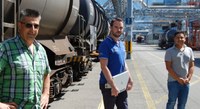Graduating in artificial intelligence and impacting an entire company
In January 2019, a young engineer from Syngenta in Monthey named Edwin Kerouanton received a phone call while on a motorway rest area. He immediately said yes to the offer he was made to develop artificial intelligence based tools. A few weeks later, Edwin was one more time a student, but this time having an employer. After 18 months, with nine other pioneers he is about this receive his Master in artificial intelligence. The particularity of this diploma is to link theoretical learning with the achievement of project of the company. This demanding curriculum is divided in two: one half being dedicated to the job, the other to studying. Machine learning, neural networks, programming, all these topics are covered by the courses provided by Idiap researchers. The role of the Institute goes beyond teaching, as each company is coached individually depending on the needs of its project, for example in the industry 4.0.
Identifying the needs of the company
Responsible of the method group at Syngenta, Hernan Aguiar was part of the team who selected eight projects that could potentially be developed with artificial intelligence, ranging from quality control to resources optimization. “We evaluated the feasibility and the level of priority of the projects in collaboration with Edwin and Idiap. Using this analysis, we decided together to work on an apparently simple task: renaming e-mails and pdf documents,” explains Aguiar. “Until now, people had to realize this time consuming task–about 350 hours per year–, which is a source of potential mistakes. Nevertheless, this work is crucial to ensure the tracking of our operations and of the deliveries of the raw materials provided by about 180 suppliers,” adds Pascal Saudan, quality control specialist for the production site.
The first step for a successful project was to understand users’ needs. “It’s important for the workflow of the engineer and even more to implement artificial intelligence. AI’s quality relies on the use of relevant data,” says Edwin Kerouanton. “This is why I spent so much time with my colleague Pascal Saudan. Our discussion helped him to have a clearer vision of his needs.”
Optimization and cross strategy for economies of scale
Today, the time allowed to this task was already cut by 60%. The final goal is 80% less. “Thanks to this, we have more time to concentrate on significant tasks,” emphasises Pascal Saudan. Another advantage of this project is that it can be exported to other departments and even to other sites of the group. “We have data for energy saving and of raw materials, predictive maintenance, process optimization. It’s up to us now to exploit them with these new tools,” explains Hernan Aguiar.
If most companies could harness the potential of artificial intelligence, to identify available data and the way to exploit them effectively is a real challenge. “Thanks to our experience, we can support our partners to implement the project which fits their needs and their resources,” says Joël Dumoulin, responsible of the technology transfer at Idiap. This personal coaching contributed to the success of Edwin Kerouanton at Syngenta and motivated the company to repeat the experience by hiring a new student-employee.
More information
- Dual Master in Artificial Intelligence
- Site of Syngenta in Monthey
